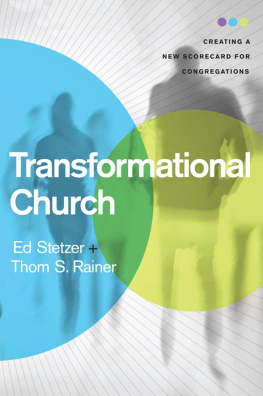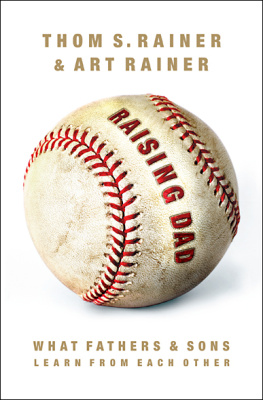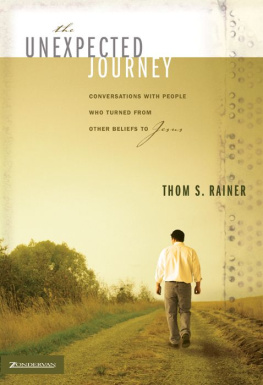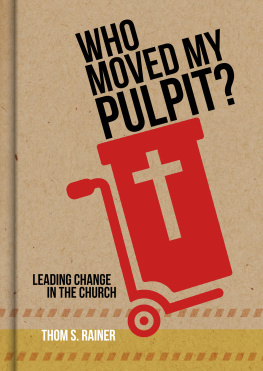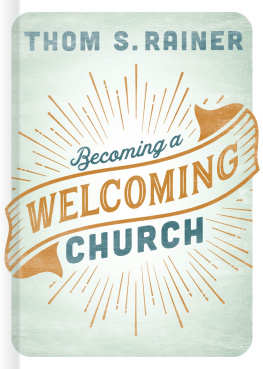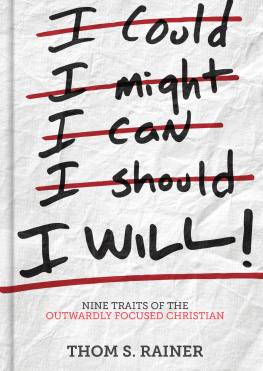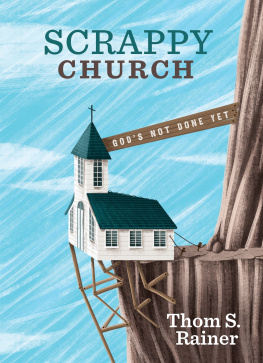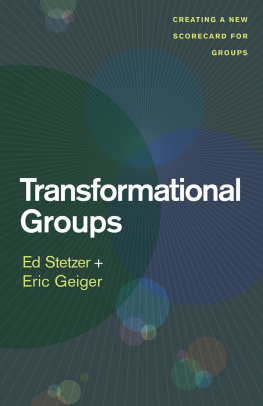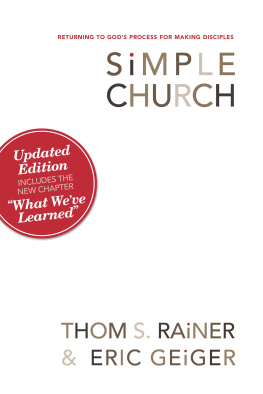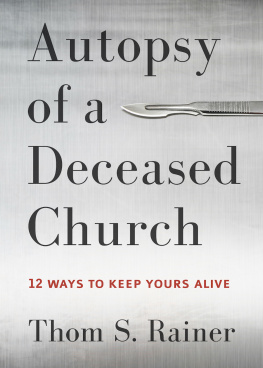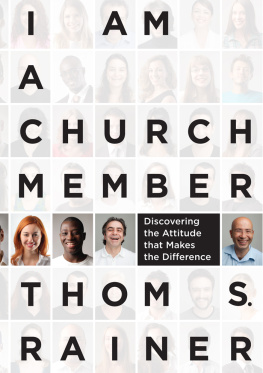

Copyright 2010 by B&H Publishing Group and LifeWay Research
All rights reserved.
Printed in the United States of America
978-1-4336-6930-9
Published by B&H Publishing Group,
Nashville, Tennessee
Dewey Decimal Classification: 260
Subject Heading: CHURCH \ CHURCH GROWTH \ CHURCH RENEWAL
Unless otherwise noted, Scripture quotations are from the Holman Christian Standard Bible. Copyright 1999, 2000, 2003, 2009 by Holman Bible Publishers. Used by permission. Holman Christian Standard Bible, Holman CSB, and HCSB are federally registered trademarks of Holman Bible Publishers.
1 2 3 4 5 6 7 8 9 10 14 13 12 11 10
This book is dedicated to churches trying and struggling to be on mission in their contextdont give up. God is still working in and through the church.
FROM THOM
To my three grandchildren: Canon, Maggie, and one who will be born shortly after this book is released. In each of you I have great hope and promise.
To Nellie Jo, of course. You always make me smile.
FROM ED
To my three girls: Kristen, Jaclyn, and Kaitlyn. The grace of God I see at work in your lives gives me hope for the future of the church.
To Donna, my wife and best friend. Thanks for the constant joy you bring to my life.
ACKNOWLEDGMENTS
THE TRANSFORMATIONAL CHURCH STUDY is the product of a whole host of people who deserve our thanks.
First is the team at LifeWay Research. Scott McConnell, Director of Research, is a great friend of the church. We appreciate his intellectual ability to interact with the minutia of the data and then see the overarching principles at work in the church. Thanks also to Lizette Beard who served as the Project Manager for the process. Many churches in our study are the beneficiaries of her love for the church and ever-growing desire to see the gospel penetrate our culture. Other members of the LifeWay Research team deserve mention as well. Melissa Kendall, Matt Lowe, Sandra Wilson, and Shirley Cross are indispensable to all we do. Thanks also to Courtney Eichelberger, Melody Raines, Danny Moore, and Melanie Gillen for their work with the team.
We also want to thank our friend Eric Geiger. Early on, Eric took on the task of understanding the initial findings of the survey. His understanding of the church and ability to see the principles emerging from statistical surveys is an uncommon gift among pastors.
Some of the unsung heroes of the Transformational Church study were the church consultants from LifeWay. Led by David Francis, these men and women spent many days traveling our country and interviewing churches. The encouragement they returned with from the field gives us a great hope that the stories told and the principles taught in this book will aid countless churches in the future. Thanks goes to our team: David Trammel, Elgia (Jay) Wells, Doug Merritt, Dan Garland, Larry Golden, Pat Ford, Rusty Richardson, Steve Taylor, Terry Martinaz, Charles Grant, Jeffery Curtis, Renee Hardwick, Chuck Gaines, Eddie Clay, Jim Maddox, Ken Lupton, Richard Edfeldt, Sam Galloway, David Burt, Doug Akers, Sharon Burroughs, Keith Feather, Michael Gentry, Paul Billingsley, Tom Crocker, Barry Sneed, Barry Campbell, Mike Tucker, Diana Frey, and Bill Banks.
We also want to thank Mike Harland, David Francis, Bret Robbe, Bruce Raley, and Rick Howerton for making significant contributions to our thinking about worship (from Mike) and the small-group structure of the church (from David, Bret, and Rick). Also, Dino Senesi, Todd Littleton, Jared Wilson, Trevin Wax, Marty Duren, Chris Brewer, and Matthew Smith provided invaluable input and assistance.
Thomas Walters and the team at B&H Publishing are always at the top of our list of people to thank as well. We are ever grateful and constantly in awe of the work they do to make our writing better so you will benefit from the content of the teaching we hope to impart.
Thanks also to Philip Nation, Director of Ministry Development at LifeWay Research, for his work to help guide the content of this book toward completion. Without Philip, there would be no Transformational Church book.
Thanks to the experts who consulted with us during the quantitative research phase of the project: Alan Hirsch, Chuck Lawless, Elmer Towns, Bob Whitesel, Gary McIntosh, Bill Easum, and Dallas Anderson. We are honored to serve as colleagues in the ministry with these men. But more than that, we are blessed to call them friends.
We spend a lot of time on the road and writing at home. We could not do what we do without the love, support, and patience of our wives. Nellie Jo and Donna deserve so much more than these mere words. We still want our wives to know of our deep love and appreciation for each of them. We are two blessed men.
CONTENTS
Hope for Transformation
TRANSFORMATION + CHURCH
For followers of Jesus, these are two of the most important and powerful words in the world.
We treasure the concept of transformation, because radical change is the heart of the Christian message and because the power of the gospel changes everythinglives, churches, and communities.
Christians love church, because God has chosen the community of Christ followers to make known His manifold wisdom (Eph. 3:10). When God transforms lives, He doesnt just build temples of the Holy Spirit in individuals, He builds His church by adding more lives to the body. God uses the individuals in the church to bring about the transformation of more individuals and, consequently, the growth of the church. The church is Gods tool and instrument for His kingdom agenda.
The concepts of transformation and church play off each other, complement each other, connect to each other. And when you put not just the nouns transformation and church together (as we have in the title), but put together the actual occurrence of transformation and the community of people called the church, the result is powerful. Its amazing. The result is transformation and church the way God designed them to be.
The truth is that transformation is non-negotiable for the Christian church. But change is not the norm for many of our churches. We are supposed to see transformation, but too often we see stagnation. Gods plan is that We all, with unveiled faces, are reflecting the glory of the Lord and are being transformed into the same image from glory to glory; this is from the Lord who is the Spirit (2 Cor. 3:18). That means that we (as individuals) and we all (as the church) are supposed to see this transformation. Transforming from glory to glory should be normal, but too often it is exceptional. Our passion is to help the church see, aspire to, and achieve biblical transformation.
We are supposed to see transformation, but too often we see stagnation.
Our longing to understand how God transforms people and communities through His church led us to undertake this research projectthe largest ever of its kind. We, alongside dozens of other leaders, threw ourselves completely into this project in order to better understand how some churches are experiencing this transformation today.
Change
There is no avoiding change. Ever heard the saying The only constant is change? Its a truism built upon the reality that change is built into life itself. Most times we dont even have to do anything to bring change aboutchange just happens. Every day we encounter all sorts of new developments, good and bad. No matter what we do, change comes to all of us. In fact, you dont have to do anything. Just sit there; change will find you.
Next page
